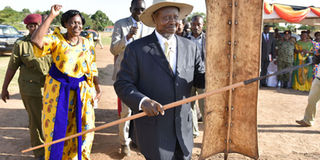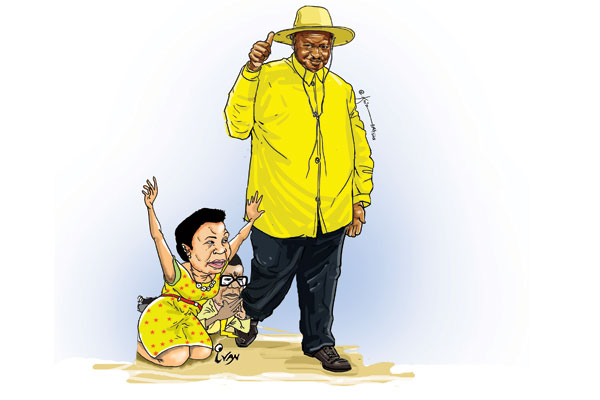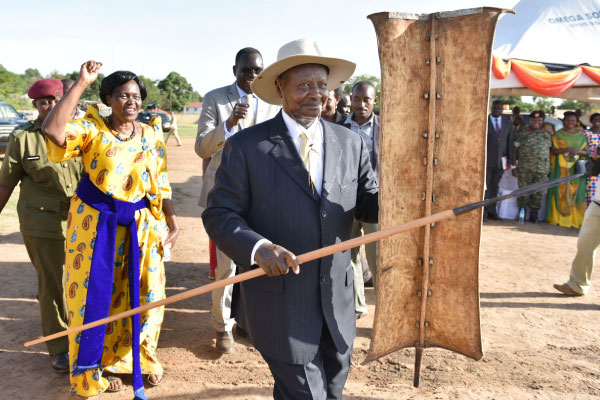How Museveni has depleted Opposition ranks

Hunter. President Museveni wields a spear and shield as Kitgum Woman MP Beatrice Anywar cheers at her thanksgiving ceremony at Boma grounds in Kitgum Municipality last year. FILE PHOTO
What you need to know:
- FDC leaders say NRM dangles both the carrot and stick.
- Carrots come in the form of job offers or cash, while the sticks include blocking access to jobs or businesses.
- The list of those who are working with it or have worked with it and been dropped continues to grow.
On March 29, President Yoweri Museveni spilled the beans on how he had “poached” Kitgum Municipality Member of Parliament, Ms Beatrice Anywar, alias Maama Mabira, from the Opposition to the ruling National Resistance Movement (NRM).
“I am a good poacher. If I see a good animal from the park I go for it. I have been calculating [how to get] Beatrice Anywar, because I would go to address the Parliament and the Opposition will be seated here and the NRM be there… and then the Opposition will be abusing me but when I looked at them I realised one (Ms Anywar) looks reasonable,” Mr Museveni said.
Ms Anywar is the latest statistical entry on a very long spreadsheet of people who have been lured from the Opposition over the last 32 years.
Of course there have been debacles such the events of September 14, 2001 when Mr Museveni named Mr Badru Wegulo a special presidential advisor on politics only for the then member of the Presidential Policy Commission (PPC) of the Opposition UPC to turn down the appointment with “the utmost contempt it deserves”.
That was quite humiliating, but 10 years later, Mr Wegulo, along with Mr Henry Mayega and former Government Chief Whip, Mr Osinde Wangor, were at the launch of the NRM’s 2011-2015 manifesto. Mr Museveni declared that he had hooked some “big fish”.
Mr Wegulo, who had earlier declared that he had been “at the forefront, as a leader in the UPC, of opposing the 16 years of terror, misrule, corruption, plunder, dictatorship, and genocide perpetuated by Museveni’s regime,” was at hand to appeal to Ugandans to hand Mr Museveni another term if they wanted “peace, security, harmony and prosperity”.
Despite a few such glitches, Mr Museveni has largely been successful in what appears to be a long term mission to decimate the Opposition which he views as “useless”.
Related content
After shooting its way to power, the NRM drew up a minimum working programme that would bring together the different political forces for purposes of unifying the country and ensuring peace.
As a result, almost half of the first Cabinet of 48 ministers was composed of people from different political groupings. DP had, among others, Dr Paul Kawanga Ssemogerere, Prof Yoweri Kyesimira, John Ssebaana Kizito and Robert Kitariko.
Others were Mayanja Nkangi (CP), Stanislaus Okurut and Edward Kakonge from UPC, Andrew Kayiira from the Uganda Freedom Movement (UFM) and Gen Moses Ali from the Uganda National Rescue Front (NRF).
In the years that followed, Cabinet was expanded to accommodate more people from the parties and academia.
Those who joined later include Dr Speciosa Wandira Kazibwe, Mr Gerald Ssendaula and Kafumbe Mukasa from DP and Robert Ekinu from UPC, but save for a few exceptions like Ssebaana Kizito, most of them stayed even when laws that were designed to kill the parties were mooted in the National Resistance Council (NRM), the then Parliament of Uganda, or when Dr Ssemogerere quit.
Even those like Wasswa Ziritwawula, who had earlier resigned from the NRC to protest the extension of the NRM’s term, was to later join the NRM.
According to the paper, An Insider’s View of How NRM Lost the Broad-base, which was authored in 1999 by Col Dr Kizza Besigye, which occasioned his fallout with President Museveni, the NRM set up a committee headed by the late Eriya Kategaya, to engage the various groups, but the discussions never amounted to much.
No formal arrangement
“It would appear that once the leaders of the political parties were given “good” posts in the NRM government, their enthusiasm for the discussions waned, and the process eventually fizzled out,” he wrote.
While Dr Besigye seems to suggest the Opposition was to blame, there is no evidence that the NRM ever tried to make the committee work. The NRM never facilitated the process of creating a structured way of engaging the parties, preferring to deal with individuals and not political parties. Why?
The deputy director of the government-owned media centre, Mr Shaban Bantariza, says it is unnecessary because the NRM is a “mass party which has always won absolute majorities”.
“One doesn’t have to make a formal arrangement or have a structured engagement. That would require the parties to nominate who the President includes in his Cabinet. What if the President does not believe in that person’s competence? What if he is coming to undermine the government?” he asks.
Despite lack of a structured way of engagement, members of the Opposition have been all too willing to work with the NRM. The list of those who are working with it or have worked with it and been dropped continues to grow.
They include Ms Maria Mutagambwa, Mr Aggrey Awori, Mr Daniel Omara Atubo, Prof Gilbert Bukenya, Mr Jacob Oulanyah and Mr Christopher Kibazinga.

Others are Mr Alex Onzima, Ms Betty Kamya, Mr Badru Wegulo, Mr Nelson Ocheger, Ms Nakiwala Kiyingi, Ms Betty Amongi, Mr Muhammad Baswari Kezaala, Mr John Butime and Maj Ruranga Rubaramira.
This year the bandwagon has so far taken Ms Beatrice Anywar and former Jinja UPC chairman Robert Kanusu.
So far the luckiest of the poached has been Prof Bukenya who rose to the vice presidency.
Others are Maria Mutagamba and Prof Ephraim Kamuntu, serving more than a decade in Cabinet. Others have been one termers before being sent packing. Why then are people scrambling to join the NRM? How does it do it?
Multiple recruitment desks
NRM sources indicate that it has multiple desks headed by officials in the army, the party and State House, all armed with a reasonable kitty and charged with recruiting from the Opposition.
Generals Kale Kayihura, Henry Tumukunde and Salim Saleh, have all been named as having been or still active in this undertaking.
Gen Tumukunde was active in parts of eastern Uganda ahead of the 2006 general elections. He pitched camp at the Nile Resort Hotel in Jinja where he held meetings with individuals across the political spectrum to snuff out what had been rising support for the then newly-formed FDC.
The former Jinja West MP, Mr Harry Kasigwa, who took a back seat after suffering defeat at the hands of NRM”s Moses Grace Balyeku in 2011, will not say whether he was “reached” or not, but he is believed to have been asked to “step aside” and concentrate on his business instead of “bothering with those things”.
Sources close to Mr Kasigwa indicate that he was reached by Gen Salim Saleh with whom he had developed some rapport during the latter’s time at the Senior Command and Staff College Kimaka.
In a recent interview with Sunday Monitor, Butambala MP Muwanga Kivumbi, who is also the Shadow minister for Internal Affairs, said Gen Kayihura has been actively tapping into the Opposition.
“He has been pivotal in reaching out to political groups that Mr Museveni and the NRM had never been able to reach out to. This could be seen from the way he mobilised to collect more than 500,000 people and form them into what he called crime preventers, who were actually cadres of the NRM,” he said.
Before her appointment as principle private secretary to the President, Ms Molly Kamukama, who had been working as head of research, had been actively involved in the recruitment drive.
Two former FDC candidates for seats in parts of eastern Ugandan claimed they were recruited by Jinja West MP Moses Grace Balyeku, and taken to meet Ms Kamukama, but that the talks broke down.
Other party officials said to have been active include the secretary general, Ms Justine Kasule Lumumba, and the special assistant in the chairman’s office, Ms Milly Babalanda Doka. These two were pivotal in the luring Mr Robert Kanusu from UPC.
Motives
FDC secretary general Nathan Nandala Mafabi believes that the continued poaching is meant to demoralise the populace and slow down the democratisation process.
“If people look around and see that whoever they have been looking up to for leadership and inspiration is leaving, they give up. That undermines leadership and leaves the NRM looking very strong,” he argues.
The FDC vice president for eastern region, Ms Salaamu Musumba, thinks that the motive is to subjugate the entire populace.
“This is some form of conquest. People are being sought for to conquer,” she says.
Different approaches
Ms Salaamu Musumba, who enjoys a great friendship with Ms Justine Lumumba, has been on the NRM’s radar for quite some time. NRM “secretly” supported her against the party’s official candidate, Mr Thomas Kategere, in the 2012 Kamuli LC5 by-elections.
In October 2014, Musumba was part of Mr Museveni’s entourage to the Vatican and she and Mr Museveni put on public shows of camaraderie. She revealed that approaches were made through family and friends. She also confirmed having met Mr Museveni.
“Mr Museveni is a very convincing person. Talking to you, you see a well-meaning person, but his system is that if you are to work with him, you have to be under him (join the NRM), which I found unacceptable,” she said on phone.
Ms Musumba and Mr Mafabi say although the tactics change from time to time and depending on the individuals being engaged, the NRM generally dangles both the carrot and stick. Carrots come in the form of job offers or cash, while the sticks include blocking access to jobs or businesses.
“If you harden, they will use economic disempowerment by making you either unemployable or if you are in business you will find yourself handed weird tax assessment. If you are in a partnership with others, they will make your partners start feeling uncomfortable with you,” she says.
Without naming anyone in particular, Mr Mafabi says there have been cases where financial institutions have been forced to recall Opposition politicians’ loans, which forces them to run to Mr Museveni for help.
In 2010 when Wegulo, Wangor and Mayega joined the NRM, Mr Robert Kanusu, who was the press secretary of UPC President Mr Olara Otunnu, lashed out at the trio saying they had joined the NRM “to get their pensions”.
Eight years later, Mr Kanusu joined them, but says he had done so “conditionally”.
In explaining his actions, Mr Kanusu revealed that following the two defeats he suffered in the 2011 and 2016 Jinja District LC5 polls, he realised that, “he could not fight the system any more”.
In October last year, Mr Kanusu, who has been active in organising boat regattas and boat racing championships, was meant to lead a team of Ugandan delegation of 30 people to the Dragon Boat World Championship in the Chinese City of Kunming, but although the Chinese embassy in Uganda had offered to meet the cost of transport, he failed to access government funding.
“All that failed because of my identity. I decided to join the ruling party so that my projects can go on,” he says.
With such an array of tactics at its disposal one wonders how many Opposition figures will remain standing.







